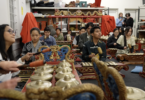The Australian Federation of International Students (AFIS) is calling on universities to take greater action in tackling gambling addiction among international students.

Photo by nicubunu.photo/Flickr
With a recent Swinburne University study revealing international students are almost six times more likely to develop gambling problems than the general population, AFIS vice-president, Nam Ho Kim, has called for universities to take a stand on the issue
Mr Kim said widespread reluctance by international students to approach university counsellors for gambling advice meant many didn’t recognise the extent of the problem.
He said this resulted in a failure to prioritise gambling support services in their information resources.
“A researcher has found 6.7 per cent of international students have problems gambling, this is higher than local students,” Mr Kim said.
“6.7 per cent of international students have problems gambling…”
“I don’t think universities see this as a serious issue.” (Nam Ho Kim, AFIS vice-president)
“I don’t think universities see this as a serious issue.”
Mr Kim said international students should be educated about the risks of gambling when they arrive on campus, suggesting gamblers support pamphlets be included in information kits during orientation week events.
He also said university student societies should train responsible gambling ambassadors within prominent ethnic student groups.
These ambassadors would be briefed on available support services and students may find them more approachable, as unlike student counsellors they would share the same language and cultural background.
Mr Kim said, “the issue is quite sensitive and it’s difficult to get people to share their experiences.”
“The issue is quite sensitive and it’s difficult to get people to share their experiences,” (Nam Ho Kim)
“International students really want to talk to their own ethnic groups.”
Sami, an international student battling gambling addiction who didn’t want his full name published, doesn’t think it’s up to universities or student unions to combat gambling.
He said making the decision to stop is a personal one.
“If I want to play poker, no one in the world can stop me” (Sami, international student)
“I think it is more of an individual thing. If I want to play poker, no one in the world can stop me, ” he said.
Sami believes the best way to manage and overcome addiction is to keep him-self busy.
“I am always looking for something else to do,” he said. “If I stay idle in some place I go back to that thing (poker).”
For Sami, theatre was a useful way to distract him-self and confront his problems.
After participating in Life’s a Gamble, a theatre project exploring the issue of problematic gambling among international student groups, Sami believes he has made progress in reclaiming his life from addiction.

Photo by sampsyo/Flickr
He said the project helped him to finally confront his gambling problem, learn about support services, make friends and improve his English.
While he still battles with his gambling today, and firmly believes it will be up to him to finally kick the habit. He also said universities could help by creating more theatre projects aimed towards international students.
AFIS founder, Wesa Chau, is a former Young Victorian of the Year and Responsible Gambling Week Ambassador. Early last year she spoke to ABC Radio Australia about problem gambling among international students.
Should you or someone you know require assistance for gambling related problems, contact Gamblers Help 1800 858 858 or visit their website. Translation services are also available if required.





